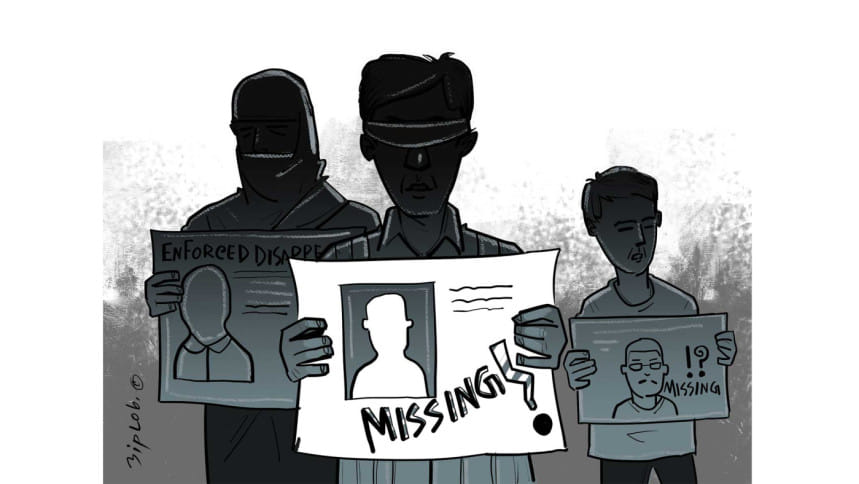Capital punishment for disappearance leading to death

The interim government yesterday approved in principle the draft of the "Enforced Disappearance Prevention and Redress Ordinance-2025", which proposes the death penalty as the maximum punishment in certain cases of enforced disappearances.
The draft stipulates the death penalty in cases where enforced disappearance leads to the victim's death, the recovery of their body, or when the victim remains untraced -- alive or dead -- even after seven years of the incident.
In cases where punishments other than the death penalty are imposed, offenders may also be liable to pay a fine of Tk 1 crore.
Members of all state forces -- including the armed forces, police, Rab and Ansar -- may be held accountable if they are proven guilty in such cases.
The draft ordinance was approved at yesterday's weekly meeting of the Advisory Council at the Chief Adviser's Office with Chief Adviser Prof Mohammad Yunus in the chair.
There will be further discussions on the proposed ordinance before it gets final approval, CA's Press Secretary Shafiqul Alam told journalists at the Foreign Service Academy.
The draft states that instead of law enforcement agencies, the National Human Rights Commission (NHRC) will investigate the cases related to enforced disappearances.
The draft also includes a provision for a financial penalty and two years' imprisonment for anyone found guilty in court of filing a false case related to enforced disappearance.
The draft ordinance states that if a government employee, law enforcement member, or any individual -- acting on their own or with official approval or even consent -- forcibly disappears someone, it will be considered a criminal offence.
Any person or persons found guilty of such an offence may be sentenced to life imprisonment or imprisonment of up to 10 years, along with a fine of up to Tk 50 lakh.
Concealing, destroying, distorting, or altering evidence of disappearance may be punishable with up to seven years' imprisonment and a fine of up to Tk 20 lakh.
Anyone involved in building or operating secret detention centres may face up to seven years' imprisonment and a fine of up to Tk 10 lakh.
According to Section 4(6) of the draft, anyone who visibly attempts, orders, instructs, assists, incites, or conspires to forcibly disappear someone will be punished with the same penalty as the principal offence.
Section 4(7)(a) states that if any subordinate, under control or authority, is involved in a disappearance or conspiracy to forcibly disappear someone, and the superior consciously ignores the information despite being aware, he will also face the same punishment as the principal offence.
The draft in section 4(7)(c) stipulates that failure to take necessary steps to provide relevant information under one's jurisdiction to the competent authority for the prevention, investigation, and trial of enforced disappearance will result in the same punishment as the principal offence.
Section 6 makes it explicit that enforced disappearances cannot be justified under any circumstances, including war, threat of war, internal political unrest, concerns over state security, or any similar pretext.
NHRC EMPOWERED
Several chapters have been added to the proposed ordinance to empower the National Human Rights Commission (NHRC), giving it full authority to act on cases of enforced disappearance.
The draft law grants the NHRC the authority to receive complaints, conduct inquiries and investigations, and, when necessary, oversee ongoing investigations.
The NHRC may visit any prison, jail, detention centre, or facility across the country and collect information or documents from individuals or institutions. To uncover secret detention centres, it may inspect any premises and take legal action if such facilities are found.
In addition, the NHRC may appoint separate investigation teams to deal with disappearance cases. If necessary, it may delegate investigative authority to a police officer not below the rank of sub-inspector or to any other person or institution.
The NHRC can replace an investigating officer at any time, and the case record must be handed over within 48 hours. If there is sufficient evidence, the officer may arrest the accused, and all parties concerned -- individuals or institutions -- are obligated to cooperate.
The draft states that before arresting a government employee, approval from the NHRC is required, but prior permission from the employee's appointing authority is not needed.
In cases of enforced disappearance, all government institutions must provide any assistance requested by the NHRC during investigation and trial.
If an employee fails to cooperate or neglects to carry out the commission's or tribunal's orders or recommendations, it will be considered misconduct and incompetence, and disciplinary action may be taken under service rules.

 For all latest news, follow The Daily Star's Google News channel.
For all latest news, follow The Daily Star's Google News channel. 



Comments